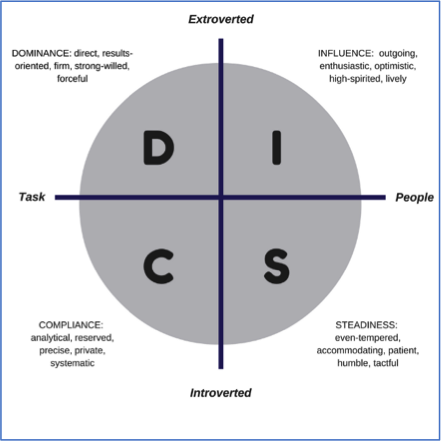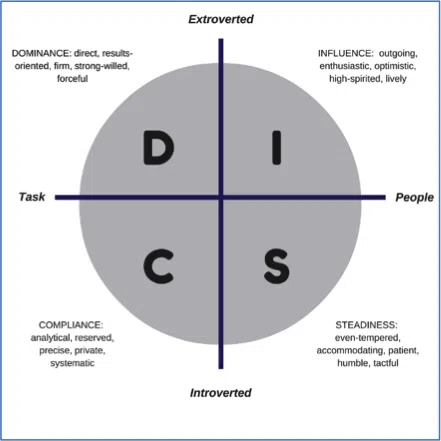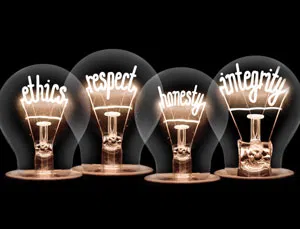Personality assessments can help your company improve hiring, placement, and management. By knowing what motivates people, and what stresses them out, you can improve your ability to hire the right person, supervise your staff, and even improve your sales closure rates.
What are Personality Assessments?
They are many different methods of assessing human personality traits, characteristics, and makeup; most of these work in similar ways. In this article, we will be discussing the DISC method of personality assessment and how it relates to your company.
What is DISC?
This is a self-report system. By that, we mean you take the test without any help or interaction with the administrator. There are about 50 to 100 questions and the process will take about 20 minutes to complete. There are many organizations that offer the DISC assessment. Most of these can be taken online and printed immediately.
DISC is an acronym that measures to what degree your personality is Dominant (D), influential (I), Steady (S) or Conscientious (C). Most people have a main personality trait as well as a secondary trait. When people are put into situations where they must act in a manner that does not come naturally, that is called a “stretch behavior.” This person will quickly become stressed and delusional with their job, and their performance will likely show it.
Limitations
Personality assessments do not measure honesty and they do not measure competency. Just because someone exhibits a certain personality style, does not mean they are skilled at it. A person could be a high “D” and a poor manager. They could be a high “I” and an ineffective salesperson. However, it could also mean that they have a higher likelihood of being successful at those jobs if they had adequate training.
Assessment results can vary by day. Your results can vary depending on your stress level or mood at that time. However, a clear pattern is usually present. Your first results are typically the same results throughout your life.
The Four Personality Types and How to Recognize Them
 D for Dominance (10-12% of the population)
D for Dominance (10-12% of the population)
The Leader. Task oriented. Direct, decisive, confident, strong-willed, competitive, and forceful (fast-paced and skeptical). Of the four personality types, they tend to be the least loyal and the most likely to bounce from job to job. They tend to avoid rules and regulations. They are often argumentative and tend to overstep authority.
How to Recognize Them
They have a louder voice and are animated while speaking. They tend to sit forward in their chair or prefer to stand. While standing, their hands are often on their waist. While seated, their arms are usually not folded, and their legs are typically not crossed. They tend to offer quick responses to questions. They might interrupt you or finish your sentences. They are poor listeners and they are unlikely to ask many personal questions. They are not afraid to challenge people and they can’t stand weakness.
I for Influence (10-12% of the population)
People oriented. Intuitive, social, persuasive, talkative, charming, and lively (fast-paced and accepting). They are creative problem solvers, peacemakers, and usually have a good sense of humor. They often speak before thinking.
They are concerned with popularity. Their biggest fear is usually rejection. They often lack attention to detail. They are motivated by praise and want a friendly environment. They have a short attention span when stressed. They need someone else to handle the details.
How to Recognize Them
They tend to be friendly, energetic, and spontaneous during meetings. They are great listeners and will likely use and remember your name as well as remember personal traits. They are usually very positive and enthusiastic. They are great at starting projects but terrible finishers.
S for Steadiness (60-70% of the population)
The Peacekeeper. More reserved at work, but people oriented, they are dependable, team players. Gentle, great listener, patient, accommodating, soft-hearted and accepting, slow, methodical, detailed, and they have a steady pace. Like to say yes. Dislike change and conflict. They are the most loyal of the four personality types and tend to be very honest.
They resist change and take a long time to adjust to it. They hold grudges and are sensitive to criticism. They have difficulty setting priorities. Their biggest fear is typically a loss of security.
How to Recognize Them
They are usually sensitive and low keyed. They tend to speak more in statements rather than questions. They will ask about your personal life and listen carefully. They are motivated by recognition for their loyalty and dependability.
C for Conscientiousness (10-12% of the population)
The thinker or calculator. Reserved and task oriented. Private, compliant, cautious, analytical, and logical (moderate-paced and skeptical). Like data. Deal with facts and figures as opposed to feelings and emotion. They are systematic and have high standards.
They need clear cut boundaries, rules, and procedures. They resent managers that do not enforce established rules. They will give in rather than debate a point. They tend to get bogged down in minute details. They are motivated by high company standards, limited social interaction, detailed tasks, and logic.
How to Recognize Them
Even tempered. They are usually reserved and quiet and may be considered to be “standoffish.” They will ask a lot of fact-finding questions and may pause between questions to think about your answers. Serious, direct, and formal in meetings and conversations. They are not typically very animated in speech or while listening.
What’s the Best Personality Style?
There is no "correct" or “best” style. Each trait has its own strengths and weaknesses. Most people have two dominant traits with the other two being very low. For example, I am very high in “D” and “I” but very low in “S” and “C.” I can lead the company and sell the products, but I hate details, things are going to get missed. You must take the good with the bad.
Using DISC to Manage Employees
Don't use DISC as your sole means of selecting employees. Remember, DISC does not measure honestly, intelligence, experience, or ability. DISC will help you realize who you are dealing with, what jobs they might enjoy, and how to deal with them.
For example, a good salesman usually has an “I” personality, while a technician is more of a “C,” and the characteristics of an “S” personality work well for office staff and customer service representatives.
When managing a “D,” you can be more direct and confront that person head-on without causing hurt feelings, while an “S” requires a subtler approach and a conversation in private. An “I” personality will need time limits on their assignments and you will need to set a follow-up date. A “C” can be counted on to be precise but needs clear boundaries. You must be careful criticizing them and never do it in front of others.
Profile your current employees. Do you have underperforming employees? Do they match other high performing employees? Maybe they just need a change?
Hiring using DISC
Certain positions lend themselves to specific personality traits. Here, we have tried to list common roles within a contracting company and the personality traits that do and do not lend themselves to that role. Keep in mind that not all people will have each trait within their personality profile. Other personality types will influence their overall characteristics.
Be sure to profile your best people and try to match their profiles with new hires or with people you already have but are in different positions. The best team will have a variety of personality profiles.
Let’s cover some of the main roles your company may have.
Bookkeeper
You want someone who is compliant, accurate, analytical, and careful. You need someone who is happy with repetitive tasks and does not like change.
You are looking for a high “S” or “C.” You do not want a “D” or an “I.” Ds want variety and want to avoid details. There will not be enough social interaction for an “I.”
Sales Manager
You are looking for a person with good people skills and attention to detail. You are looking for an “S” or “I.” Too much “D” can be a problem as they tend to lack attention to detail. You do not want a “C” because they are too introverted and do not like change.
Salesperson (residential outside)
You will want a person with good people skills and attention to detail. You are looking for a high “I” with “S” or even “D.” You do not want a “C” because they prefer tasks over people.
Sales Engineer (commercial outside)
This person is more technically oriented than the residential salesperson. They might deal with prospects who are also technically oriented. If that’s the case, you will want someone who has an “S” with “I.” Some “C” will be helpful but avoid “D” because they want to meet goals versus please people.
Service Technician
This might be a person that performs commercial service or otherwise will not be in a position to sell upgrades or replacements.
If you will want someone who is reliable, analytical, even tempered, a team workers and has high standards and listening skills, then you are looking for someone who has high “S” with “C” as their secondary trait. “I” could also be high but avoid “D” as they do not like rules and have poor attention to detail.
Selling Service Technician
People oriented but technically proficient. This person will be expected to identify and capitalize on sales opportunities. You will want to find a person with “I” and “S.” Avoid high “C” people. Moderate “D” can be also be helpful.
Installation Technician
They need minimal people skills but must be technically proficient. They must be happy working alone or without much social interaction.
Look for people with high “C” and/or “S.” You don’t want a D because they want a variety of jobs and don’t want to be bogged down with details. You don’t want an “I” because they must have people contact and plenty of social interactions.
Customer Service Rep
They must be enthusiastic and people oriented, with good attention to detail. You are looking for an “I” with “S” or an “I” with “C.” You want to avoid “D” because they are the drivers. They are demanding, impatient, and do not want to listen to a customer’s story.
General Manager
This person needs to have a take-charge personality with the ability to motivate and manage a variety of personality traits. You want a person with high “D” and “I.” You do not want a “C” because they want clearly defined priorities and pace. Avoid someone who is a high “S,” as this person could resist change and be sensitive to criticism.
Using DISC in Sales
When you are selling, you need to know who you are dealing with. Once you understand how to quickly identify the four personality types, you will be in a better position to tailor your approach and message to that particular person. For example, do not offer too many details to a “D” person. Save those details for a “C” and be prepared for a longer sales cycle. If you are dealing with an “I” type, you are going to need to build rapport and establish a relationship. Be ready to talk about their hobbies. If dealing with an “S,” keep in mind they are averse to change. You will need to paint the picture of simplicity and assure them that the new system will be easy to use, and the process will be pain-free.
Knowing “what makes people tick” is a key to being a successful “people person.” Being able to assess a person’s personality quickly and accurately will allow you to communicate better and get along with people more easily. By implementing personality tests into your company, you and your company will be more successful while making those around you happier.
To learn more about leadership tactics and strategies, and to download a leadership training package complete with industry research report, useable templates, video and more, visit EGIA.org/HVACR-Leadership.


 D for Dominance (10-12% of the population)
D for Dominance (10-12% of the population)

